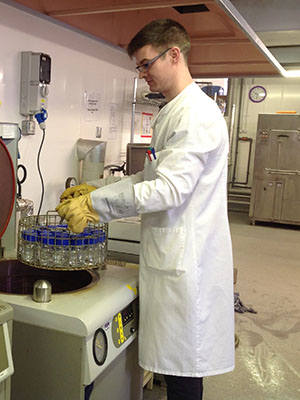Robert Shackleford RSci, Teaching and Research Technician

Name: Robert Shackleford
Registration level: RSci
Job title: Teaching and Research Technician Microbiology
Professional Body: Royal Society of Biology
Scientist type: Technician scientist
Take our short 10 types of Scientist quiz to find your scientist type!
"The apprenticeship degree backs up the experience I have gained over the 10 plus years I have been working in the microbiology profession. Firstly as a medical lab assistant and now in teaching and research."
Robert Shackleford RSci is a Teaching and Research Technician in Microbiology at the University of Reading.
Why did you decide to apply for an apprenticeship?
The degree apprenticeship I am undertaking is a level 6 laboratory scientist Biosciences BSc, part time over 5 years. I am given one study day a week in order to complete my learning. I chose to do this degree to improve and build on my current knowledge and skills, allowing me to have more impact in my current role as a teaching and research assistant. The degree covers many aspects that I am already doing in my day to day role, however, it does so in much greater detail in addition to helping improve in areas, concepts and techniques that are unfamiliar to me.
How did your apprenticeship impact your career path?
As I am still currently doing my apprenticeship, by the end of the 5 years, I hope the hard work and dedication shown in completing the degree, will allow me to access more senior roles within microbiology and the science profession in general. Furthermore, the degree backs up the experience I have gained over the 10 plus years I have been working in the microbiology profession. Firstly as a medical lab assistant and now in teaching and research.
What skills or experiences did you value most from working as an apprentice?
The degree apprenticeship has allowed me to work on skills such as analysing, interpreting and evaluating relevant scientific information, concepts and ideas through assignments and reflective writing pieces in addition to communication and presentation skills, which has allowed me to more articulately express scientific ideas and information to the students I interact with in the classes. This intern makes me more effective within my role and has a greater impact on the student learning experience as well as promoting discussions with the rest of the team by using examples from the workplace to answer my assignment questions.
What would you say to young scientists who are currently in, or thinking about starting an apprenticeship?
If you are thinking about doing an apprenticeship then it’s definitely a worthwhile experience, a lot of work and can be difficult at times to juggle work and study but ultimately it will be of a huge benefit to you. Also chose a subject that you enjoy, take time to look at what the degree covers and see if it interests you. If you do something you enjoy, it will feel a lot less like work and overall will be more enjoyable.
How has Professional Registration with the Science Council made an impact on your work or career?
It is a public recognition of my knowledge and on the job experience alongside my qualifications. Furthermore, the registration acknowledges a level of competence I have as a practicing scientist, which is expressed to my employer and potential future employers. Being maintained through continued professional development (CPD) having the qualification, encourages you to continually improve your skills and knowledge and encourages you to reflect on your achievements during your career so far.
What do you value most from being a member of your professional body?
That my contributions at work are recognised and that the work I am doing/producing meets the standard required by the Science Council.
